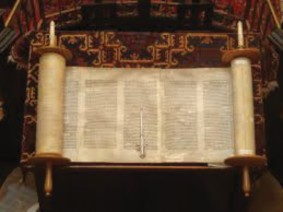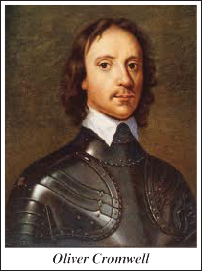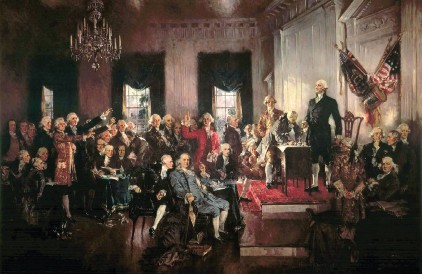 |
A LITTLE MORE HISTORY: ANCIENT ISRAEL TO U.S. CONSTITUTIONThe common denominator for ancient Israel, the British Isles and the United States is a constitution.
The TorahMany scholars have compared the Torah (the first five books of the Old Testament) to a constitution. The book of Deuteronomy is at least 4,000 years old and is still in effect and considered to be the constitution of the Jews “by those who consider the Torah a constitution”. No one denies that it is a Covenant. Deuteronomy is divided into a preamble, God and fundamental principles, the land, government and domains of authority, criminal procedure, Bill of Rights, judicial procedures, covenant obligations beyond the letter of the law, local government, and covenant curses and blessings. It comprises more than just the legal issues for civil and criminal authority but it also lays out a way of life for the Israelites to adhere to once they enter the Promised Land. In this respect it differs from modern constitutions. The reason the Israelites needed a constitution is that Moses could not enter the Promised Land and therefore the people needed direction as to how to be governed. Moses restated the Covenant in writing. The book of Deuteronomy restates but does not change the first four books of the Torah. This was a reiteration of the Covenant between God and Israel. “Covenant” is the key word here. A constitution in modern terms is a social contract between the people and their government, “contract” being the controlling term.
In legal terms a contract is a covenant. The Torah is a constitution that cannot be amended because it is a covenant with God. We will always have it as a reference. During the Puritan Revolution in Great Britain (1628-1660) a series of Acts of Parliament, compromises by King Charles I with Parliament, and specific grants by the King resulted in a compilation of documents referred to as the British Constitution. The Magna Carta and the Glorious Revolution documents of 1688-89 cannot be excluded from the British Constitution. It is no accident that many of the rights noted in the book of Deuteronomy and other books of the Bible are included in the documents of the British Constitution. As part of a Puritan Revolution it could not be otherwise. Deuteronomy had a similar impact on the Christian world beyond Britian. As stated by Daniel J. Elazar in his paper titled “Deuteronomy as Israel’s Ancient Constitution; Some Preliminary Reflections” stated “Whenever Christian theologians, political philosophers or reformers sought biblical sources for political ideas, they turned to Deuteronomy as a major Scriptural source. The use of Deuteronomy reached its apogee during the Protestant Reformation in the sixteenth and seventeenth centuries when the founders of the new Swiss, Huguenot, Rhineland, Dutch, Puritan, and Scottish commonwealths rested their polities on Deuteronomic foundations. The culmination of this trend came at the time of the American revolutionary polemical literature between 1765 and 1805. As Donald Lutz has pointed out, Deuteronomy was cited more frequently than all citations of European political philosophers combined, a major source for the myriad political sermons of the period.” Limited government did not spontaneously combust from the minds of our founding fathers.
The Signing of the ConstitutionThe majority of signers of the Constitution in 1787 were either ministers of the gospel or Sunday school teachers. They were also well-educated men. There were 118 men who signed the Declaration of Independence, Articles of Confederation and the U.S. Constitution. All had Protestant church affiliation except one and he was Catholic. Two, Jefferson and Franklin, were diest but still members of the Episcopal Church. All were familiar with the English/Puritan Civil War that occurred in the previous century. Many of their fathers and grandfathers came to this country because the king had denied them their fundamental rights, as set forth in the Magna Carta, as well in the Petition of Right of 1628 and other English liberty documents. They were familiar with the government of ancient Israel. They wanted to write down in modern terms the rights they wanted to protect and to limit the government under which they must live. As Solomon said, “There is nothing new under the sun.” America is new in human history to the extent that many of the rights are written down in a common document that is secular and not religious. But ultimately, what has limited the government of the United States of America is the fundamental belief by its citizenry in the Universal Truths of Scripture which give us our individual rights and the other verses that limits the government. In the United States we can amend our constitution by a two-thirds vote of the Congress along with a two-thirds vote of the States. The Bible cannot be amended. |


